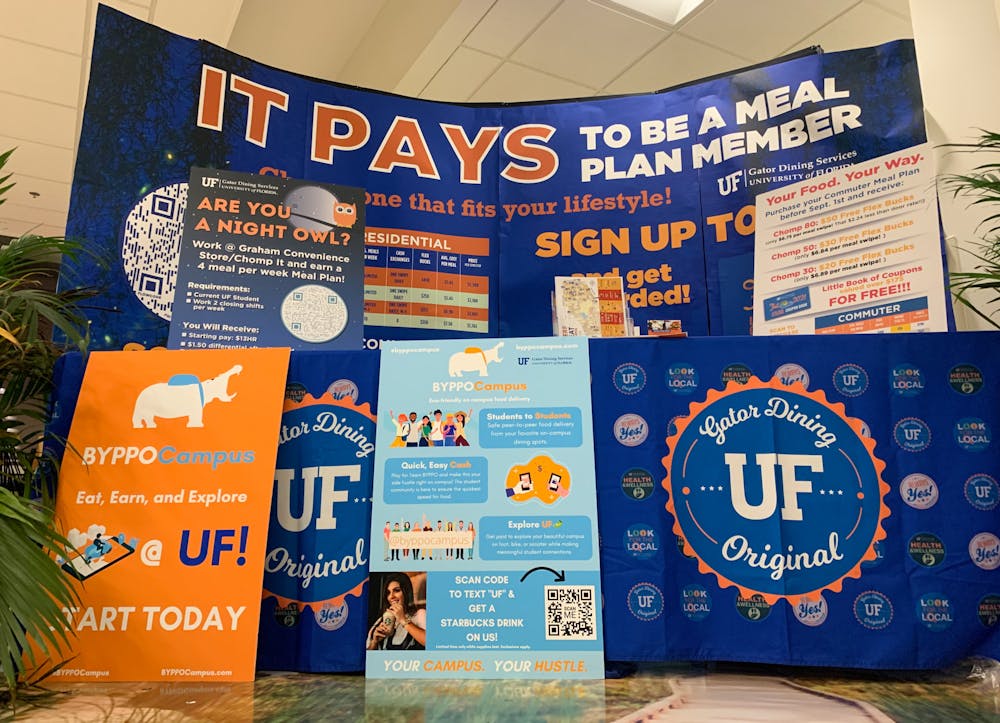While managing a nerve-wrecking transition into college, there’s one particular concern that may cross a new student’s mind: food.
Figuring out how to navigate meals can be a challenge. At UF, Gator Dining Services offers several different meal plans students can choose from. With over 50 on-campus dining options, meal plans make eating easy, and choices can be found close to all academic buildings, Nicole Jackson, Gator Dining director of student engagement, wrote in an email.
For freshmen, hanging out in the dining area is a big part of their college experience, Jackson wrote. When it comes to upperclassmen, the focus is on convenience, she wrote.
“Being a meal plan member with Gator Dining makes both of those experiences satisfying and memorable,” Jackson wrote.
Gator Dining Services offers both residential and commuter meal plans, according to its website. Students living on campus can choose from the Unlimited Orange 450, Unlimited Blue 250, Unlimited 5-Day 375 or the Gator Weekly 10 plans. Two of the unlimited plans allow students to eat at the dining hall as many times as they want throughout the week. The third offers unlimited dining hall access Monday through Friday. All four options include varying amounts of Flex Bucks, which can be used to purchase food at dining locations.
When a student selects an unlimited plan, they can also use one Cash Exchange swipe worth $6.50 per day. Students can use this to pay for their meals at specific dining locations, including Subway, Shake Smart and Papa John’s, among others. If a student purchases a meal that costs more than the Cash Exchange amount, the rest will be taken out of their Flex Bucks.
The residential meal plans are two-semester commitments whereas commuter plans are paid for per semester. The Chomp 80 is Gator Dining’s highest selling commuter plan, Tim Bucolo, the director of Gator Dining, wrote in an email. In addition, Chomp 50, Chomp 30, Chomp 65, Chomp 30 and Declining Balance are other plans available for off-campus students.
Chomp 65 and Chomp 30 plans do not include Flex Bucks for students and only provide meal swipes for the dining hall. However, off-campus students still have the option to choose a residential meal plan.
UF’s food service provider, Aramark, is not without controversy. In January, four organizations took a stand against the company to protest its use of prison labor through a boycott. Aramark has a history of wage and hour violations. UF denied the Food Justice Coalition’s request for a seat on the committee in May to negotiate the university’s next food provider.
Victoria Bible, a 19-year-old UF business administration sophomore, said she had the Gator Weekly 10 meal plan, which gave her 10 meals a week and $550 in Flex Bucks per semester, her freshman year.
“I’m really happy with the amount that I just got 10 swipes,” Bible said. “I wouldn’t have it any other way.”
She loved that she didn’t have to cook or worry about grocery shopping, she said. Although she lived in Beaty Towers, which is an apartment-style residence hall with a kitchenette, she didn’t know how to cook, leading her to get a meal plan. Bible said she found the dining hall, which was less than a five-minute walk away, to be convenient.
The dining hall food was hit or miss, Bible said. Each night, a few options were offered. Bible thought the pizza, chicken sandwiches, dessert and side items were delicious, she said. The plan she chose also allowed her to eat out and occasionally grocery shop.
“I didn’t feel like I only had to eat at the dining hall,” she said.
Bible used most of her Flex Bucks at the P.O.D. Market, she said. It offered not only snacks but also items like paper towels and laundry detergent, which she could use her Flex Bucks to purchase. She also frequented Starbucks and Chick-Fil-A.
“I would use my Flex Bucks seven days a week whereas I’d only go to the dining hall maybe five days,” she said.
At the end of the Spring semester, the Flex Bucks do not roll over, she said.
“You got to be smart and really plan it out and spend all of them or as many as you can,” Bible said.
Bible recommends the Gator Weekly 10 plan because it provides students with flexibility. Her friends who had the full access meal plan regretted it, she said, because they didn’t eat at the dining hall seven times a week. Compared to the most expensive plan, Gator Weekly 10 is about $535 cheaper per semester.
Amanda Feijo, a 22-year-old UF economics and sustainability senior, never had a UF meal plan. Feijo said she made this decision not only because it seemed overpriced to her but also because she wanted to be independent by cooking.
“I didn’t get a meal plan at any point during my college career, and I wouldn’t get it I don’t think,” she said.
One advantage to not having a meal plan was she had more freedom to choose what she ate, Feijo said. It also meant she didn’t feel guilty about eating out. Feijo said she believes she wouldn’t have been as prepared to live in an apartment if she had a meal plan.
“It was obviously a little bit challenging at first, but I think it led me to a comfortable place with cooking now,” she said.
During her freshman year, Feijo said some days she’d cook and others she’d order food out. Feijo went to Aldi for groceries because it’s relatively cheap, she said.
“I think overall it still ended up being cheaper than what the meal plan would have been, and I survived,” she said.
However, there were nights where Feijo ate crackers for dinner and days where she didn’t feel like cooking so she spent money on a meal. The pros still outweigh the cons, she said.
“Force yourself to cook,” she said. “It’s weird and maybe kind of hard at first but just do it and you’ll be thankful later.”
Contact Juliana Ferrie at jferrie@alligator.org. Follow her on Twitter @juliana_f616.

Juliana Ferrie is a second-year UF journalism student. She is excited to be working for The Alligator as the Santa Fe Beat reporter. In her free time, you can find her reading or listening to music.






